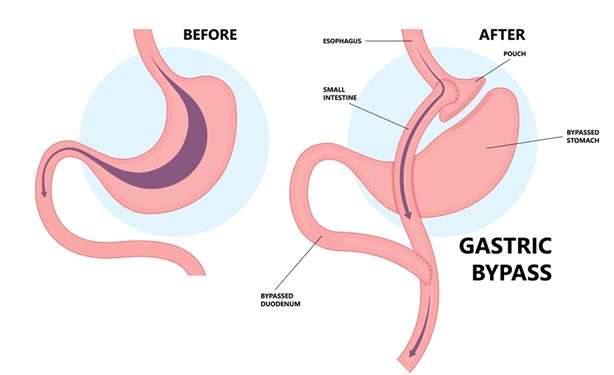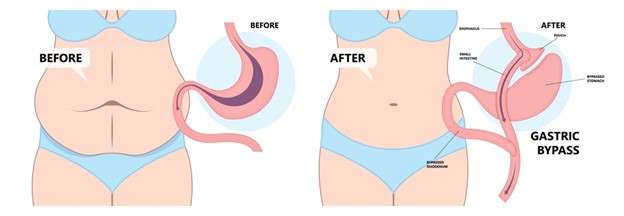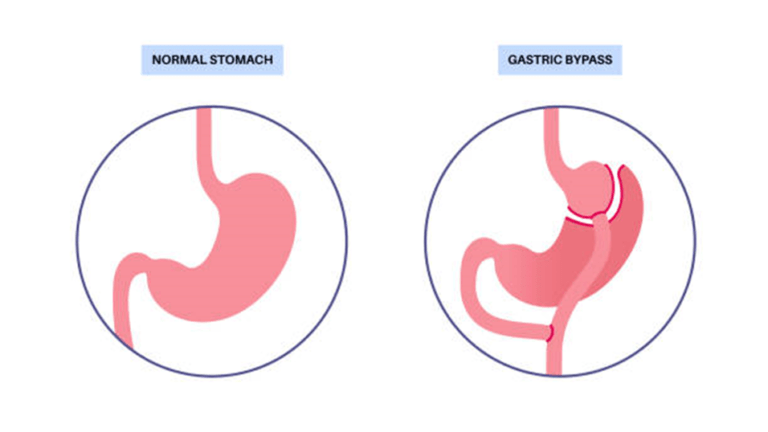Gastric bypass surgery is a life-altering procedure. It’s widely recognized for its effectiveness in weight loss and improving health conditions associated with obesity. This surgery involves creating a small pouch from the stomach and connecting it directly to the small intestine. It significantly reduces the amount of food one can eat and absorb.
But what happens to the original stomach after this transformation?
Contrary to common belief, the original stomach remains in place. It continues to produce stomach acids and enzymes crucial for digestion. It works with the new stomach pouch to ensure a balanced digestive process.
“A gastric bypass surgery is not just about weight loss,” says Dr. Harsh Sheth, a renowned Bariatric & GI Laparoscopic Surgeon in Mumbai. “It’s a long-term commitment to a healthier lifestyle. It’s a path that requires continuous adaptation and attention.”
Are you or a loved concerned about being obese? You are not alone! Reach out to Dr. Harsh Sheth for a consultation that could change your life.
It’s crucial to understand the current landscape of obesity both in India and globally. The following statistics highlight the ongoing challenges and trends in obesity. These numbers underscore the significance of continued awareness and intervention in this area:
Obesity in India
- Epidemic Proportions: Morbid obesity affects 5% of India’s population.
- Dietary Changes: Increase in unhealthy, processed food due to global food market integration.
- Income Factor: Rising middle-class incomes leading to higher caloric intake.
- BMI Criteria: Overweight considered at BMI > 23 kg/m² (vs. international standard of > 25 kg/m²).
- Prevalence: 18.9% of males and 20.7% of females are overweight or obese (2016-2021 data).
Global Obesity Statistics
- Tripled Since 1975: Worldwide obesity rates have nearly tripled.
- Adult Obesity: Over 1.9 billion adults overweight in 2016, with over 650 million obese.
- Children’s Obesity: 38.2 million children under 5 overweight or obese in 2019; over 340 million children and adolescents overweight or obese in 2016.
- Dramatic Increase in Youth: Prevalence among children and adolescents aged 5-19 rose from 4% in 1975 to over 18% in 2016.
Undergoing gastric bypass is a monumental step towards a healthier life. But what does life look like 15 years later? Dr. Harsh Sheth, an expert in bariatric surgery in Mumbai, sheds light on the long-term transformations.

A decade and a Half Later: Life-Changing Impacts Post-Gastric Bypass
Following are some common changes you can expect 15 years after gastric bypass:
Sustained Weight Loss: While individual results vary, many maintain a substantial reduction in their weight. A balanced weight can contribute significantly to overall health improvements.
Altered Eating Habits: Your relationship with food evolves. Smaller portions become the norm, and many prefer healthier options. High-sugar and high-fat foods may become less appealing or cause discomfort.
Nutritional Adjustments: You’ll need to focus on nutrient-rich foods and supplements due to reduced absorption. Regular check-ups with a healthcare provider are crucial to monitor and adjust your nutritional intake.

Emotional and Psychological Shifts: The journey impacts mental health, too. Many report enhanced self-esteem and confidence. However, staying mindful of your emotional well-being is critical, as changes can bring new challenges.
Physical Activity: Increased mobility and reduced joint pain often lead to a more active lifestyle. Regular exercise becomes an integral part of maintaining health gains.
Each journey is unique. The support of bariatric specialists like Dr. Harsh Sheth ensures you navigate this path effectively.
But what about weight regain? Is it a concern 15 years post-surgery? In the next section, let’s explore the reality of weight gain after gastric bypass.

15 Years Post-Gastric Bypass: Navigating Weight Gain Realities
Gaining weight after 15 years of gastric bypass can be a concern for many. Dr. Harsh Sheth, a leading Gastrointestinal and Bariatric Surgeon in Mumbai, provides insights into this crucial aspect.
To some extent, weight regain is normal as your body adjusts over time. However, a significant increase could indicate underlying issues. It’s essential to understand the factors contributing to this weight gain:
Dietary Habits: Over time, slipping back into old eating patterns is possible. Large portions or high-calorie foods can lead to weight gain, even with a smaller stomach.
Physical Activity: Decreased physical activity contributes significantly to weight regain. Maintaining an active lifestyle is crucial for weight management.
Metabolic Changes: The body’s metabolism may adjust over time. This natural process can affect how calories are burned. It can lead to weight gain if not managed correctly.

Have you noticed weight creeping back post your gastric bypass? It’s time to consult with Dr. Harsh Sheth, an expert weight loss surgeon in Mumbai. He can help you identify the causes and develop a plan to get back on track.
But what about other potential complications? What signs should you look out for 15 years post-gastric bypass? Stay tuned for our next section on recognizing the signs of complications long after your surgery.
Signs of Potential Complications 15 Years after Gastric Bypass
Nutritional Deficiencies: Unusual fatigue, hair loss, or brittle nails can signal deficiencies. Regular blood tests are essential to monitor your nutrient levels.
Gastrointestinal Issues: Persistent nausea, vomiting, or abdominal pain shouldn’t be ignored. These could indicate issues like ulcers or intestinal blockages.

Weight Regain: A gradual increase in weight is normal. However, a rapid gain could point to complications.
Hypoglycemia: Watch for symptoms like shakiness, sweating, or confusion. These can occur due to changes in how your body handles sugar.
Dr. Sheth stresses the importance of regular check-ups to catch and manage these complications early. Don’t hesitate to contact a healthcare professional if you notice any concerning symptoms.
Life Expectancy after Gastric Bypass Surgery
Gastric bypass surgery not only transforms lives but can also extend them. Studies show an increase in life expectancy for those who undergo this surgery. This boost is linked to the reduction of obesity-related conditions like diabetes and heart disease.
However, it’s crucial to maintain the lifestyle changes and follow-up care to maximize these benefits.
” The surgery is a tool, not a cure-all,” advises Dr. Harsh Sheth. “Your actions post-surgery are vital in enhancing your life expectancy.”
Ready to take control of your health journey? Contact Dr. Harsh Sheth for expert guidance on managing your life after weight loss surgery.
Curious about what to eat 15 years post-gastric bypass? Please continue to our next section on common dietary recommendations.
Common Dietary Recommendations 15 Years after Gastric Bypass
Navigating your diet 15 years after gastric bypass requires a mindful approach. Dr. Harsh Sheth, renowned for his expertise in post-bariatric surgery care, offers these recommendations:
Balanced Meals: Focus on balanced, nutrient-dense meals. Include lean proteins, whole grains, fruits, and vegetables.
Small, Frequent Meals: Instead of three large meals, opt for smaller, more frequent meals throughout the day. This aids digestion and prevents overloading your smaller stomach.
Stay Hydrated: Hydration is crucial, drink plenty of water between meals. However, avoid drinking fluids with meals to prevent filling your stomach too quickly.

Limit Sugars and Fats: Foods high in sugar and unhealthy fats can cause discomfort. They are not conducive to maintaining your weight loss. Choose healthier alternatives.
Chew Thoroughly: Eating slowly and chewing food well aids digestion. It also improves nutrient absorption.
Monitor Portion Sizes: Keep portions small. Using smaller plates can be a helpful visual cue.
Avoid Alcohol and Caffeine: These can be irritating to your stomach and may lead to complications.
Regular Vitamin Supplements: Continue with prescribed vitamin and mineral supplements to prevent deficiencies.
Embracing these dietary habits 15 years after gastric bypass is a commitment to your health and well-being. Remember, it’s not just about what you eat but how you eat.
If you have any concerns or need personalized advice, esteemed bariatric surgeon Dr. Harsh Sheth is always available for a consultation.
Conclusion

The journey 15 years after gastric bypass is a testament to endurance and commitment. It’s a path marked by significant lifestyle changes, ongoing adjustments, and continuous learning. The long-term success of gastric bypass isn’t just measured by weight loss but also by:
- The improved quality of life
- Better health outcomes
- The newfound confidence that comes with it
Remember, this journey is unique for each individual. Having the right support system, including GI experts like Dr. Harsh Sheth, is crucial. As you navigate the years post-surgery, remember to embrace the changes. Celebrate your achievements, and always prioritize your health and well-being.

For more information or personalized guidance, connect with Dr. Harsh Sheth.
Would you like to embark on the transformative journey of weight loss surgery?
The road post-gastric bypass is not just a path to a new body but a gateway to a new life!
Schedule your consultation today!
Frequently Asked Questions:
How does gastric bypass surgery affect pregnancy after 15 years?
Pregnancy is generally safer and more manageable. This is because significant weight loss can reduce obesity-related risks. However, monitoring nutritional intake is crucial to ensure maternal and fetal health.
Is it common to regain weight 15 years after gastric bypass surgery?
It’s common to experience some weight gain 15 years post-gastric bypass. However, significant increases are less frequent. Maintaining healthy eating habits and regular exercise is vital to managing weight long-term.

